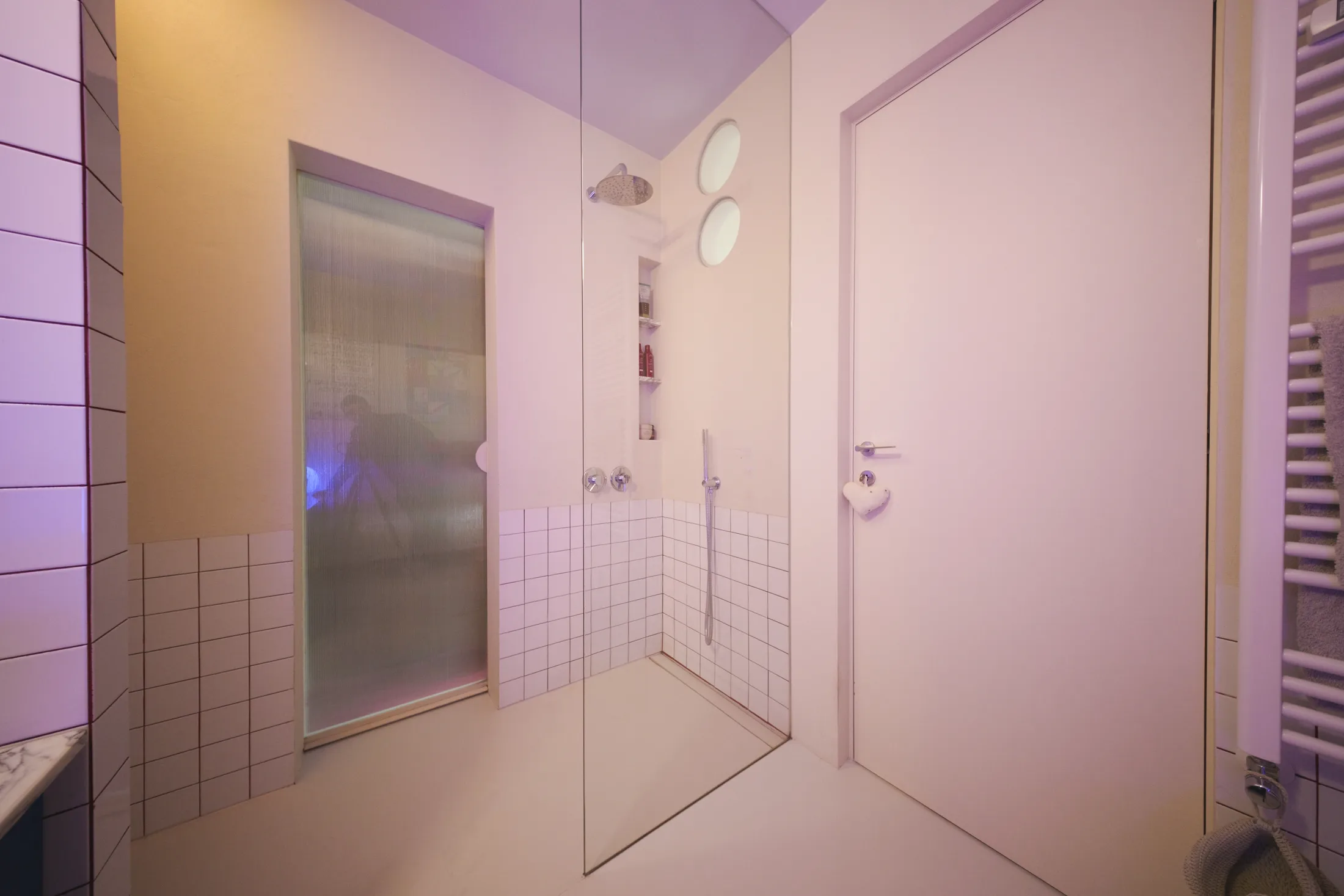Open Menu
Search

In Milan’s Città Studi district, architect Umberto Maj of ATOMAA transformed a 60sqm/645sqft apartment into a layered, light-filled home. Merging 1920s details with the demands of modern living, the design balances reverence for the past with playful reinvention.









“We often try to avoid waste, trying to restore lustre to objects and materials already present. An old floor, if courted, can become the most valuable characteristic.”








“The essential is not necessarily measurable. A tiny herb garden, a welcoming entrance, or even a small sacred nook – do these things really steal space?”









“My perfect home is a place where you can hug your friends, make noise, have parties – and feel protected,” says architect Umberto Maj. As co-founder of the architectural and design firm ATOMAA, Maj brings a poetic, story-driven approach to his work, describing spaces not just by their function but through emotion, memory, and playful architectural gestures.
Urban Nook is one such project: a 60sqm/645sqft apartment in Milan, just south of the Città Studi district – a neighbourhood originally developed for the city’s growing professional and industrial population. Today, a new generation of young residents is bringing fresh life to the area’s historic streets. Among them are Urban Nook’s owners – a bold and open-minded couple who both work as graphic designers.
“As Italians, we are used to walking in spaces that are full of history,” Maj explained. History, for the architect, isn’t something to be erased, but uncovered and reimagined. It is a perspective reflected throughout his work, including Urban Nook, where preservation is part of the design language, forming a wonderful symbiosis between the two young creatives and the 1920s apartment they now call home.
Maj turned philosophy into practice by starting with their wide-ranging and deeply personal brief. “They had many requests, believe me,” he notes with a hint of glee. Ultimately, their brief reflected the kinds of comforts many of us seek: a place to work from home, space to practise yoga, cosy spots for their cat, and thoughtful details like a window-facing spot for morning coffee and plenty of arches. Maj’s challenge with this apartment was typical of many older buildings, in Milan and elsewhere. A long, dark corridor, divided rooms, and just three windows, all facing north, meaning that, beyond fulfilling his clients’ needs, Maj would need to do a complete rethinking of circulation and light.
His first move was to shorten the corridor by removing the wall that separated it from the living room, immediately improving flow and revealing a hidden concrete pillar – now left exposed as a striking architectural feature. He then relocated the bathroom from the centre of the apartment to a darker corner, freeing up the windows. To accommodate plumbing, the floor in this area was raised by one step, creating a platform now used for a compact breakfast or work zone with a view of the neighbourhood.
What was once a dark and disconnected layout now unfolds as a continuous sequence of spaces, where transitions are marked not by doors or walls but by shifts in material and the careful play of light. A corner French window draws brightness into an otherwise shadowed corner of the living space. In the kitchen, a bright yellow curtain and arched pantry doorway act as a focal point – a moment of surprise against the surrounding tones and textures. Continuing the language of contrast, a step up in the floor marks the transition from kitchen to bathroom, and small porthole windows pull in borrowed light from adjacent rooms, keeping the space luminous without sacrificing privacy. Maj’s design choices are rooted in his philosophy of “lying to the eye”, using layering and contrast to make the space feel more expansive and full of energy.
Maj saw the floors as a bridge between past and present – not a surface to update, but a defining element of the apartment’s character. “I always tell clients they can find a treasure right there inside the house – and by that, I mean its history.” In the living area, black concrete tiles from the 1940s were restored, grounding the space with depth and richness, while in the bedroom, red cement tiles evocative of 1920s Mediterranean interiors bring warmth and personality to the sleeping area. This patchwork composition adds both an element of polish and personality.
Urban Nook feels at once personal and universal. A young couple living in an old building, honouring its past while adapting it to the pace and patterns of life today. In Maj’s hands, the design becomes a playful negotiation between reverence and reinvention. His approach to small spaces is rooted in joy, the unexpected, and the idea that what’s essential isn’t always measurable. By working with what was already there – materials, textures, and light – and introducing moments of surprise and adaptability, he demonstrates how even the most compact homes can support layered lives. Here, architecture becomes an act of continuity, carrying forward what came before, while making space for what’s next.